Working With Male Survivors

Introduction
Slide #1
Why are we having this training? A significant proportion of children sexually abused are boys. These boys then grow up with socialized expectations about manhood that not only inhibit their ability or willingness to acknowledge their victimization, but also sometimes make it difficult for them to access clinical services
Overview (not necessarily for use as part of presentation)
In this training, participants will learn more about male survivors and review the skills that will enable them to help male survivors on a crisis hotline.
Goals
To review the skills that will enable staff/volunteer/staffs to help male survivors effectively
To familiarize staff/volunteer/staffs with the social and cultural pressures that impact male survivors
To review with staff/volunteer/staffs the effects of sexual victimization on male survivors
To provide volunteers with an opportunity to identify personal challenges and confront misconceptions that might impact their ability to work effectively with male survivors.
Objectives
By the end of this training, staff/volunteer/staffs will be able to
Name at least 3 new resources for male survivors and describe the hotlines or information the resource can provide
Define
- Gender
- Sex
- Sexual orientation
- Gender identity
- Masculinity
Name at least 5 possible long-term effects of sexual abuse on men
Name at least 3 social norms that may inhibit male survivors from reaching out for help
Describe at least 3 cultural norms that may further inhibit men from communities of color from reaching out for help or accessing services
Describe at least 3 crisis intervention skills which are particularly relevant to working with male survivors
Name at least 3 ways that working with male survivors MAY differ significantly from working with female survivors
Describe at least 3 reasons that a friend or family member of a male survivor might contact a hotline
Discuss at least 3 ways that a hotline might be able to assist a friend or family member of a male survivor
Audience
Crisis intervention hotline staff and volunteer/staffs
Time
90 minutes
Materials
PowerPoint
Copy of The Psychological Impact of Sexual Abuse: Content Analysis of Interviews with Male Survivors by David Lisak for each participant.
Newsprint
Markers
Sexual orientation scenarios
Ball of yarn

What is 1in6?
The mission of 1in6 is to help men who have had unwanted or abusive sexual experiences in childhood live healthier, happier, lives.
1in6 chose its name because researchers estimate that 1 in 6 men have had unwanted sexual experiences in childhood.
Many men do not begin to deal with the negative effects of these childhood experiences until they are in their 30s or 40s, or even later.
1in6 focuses on reaching younger men, between the ages of 18 and 30, although any man who has had these unwanted experiences in childhood will find valuable information and resources on our Website www.1in6.org.
1in6 has a separate entry portal for friends, family, partners and spouses with information geared specifically toward their needs to support and understand the male survivors.

Callers may be men themselves or they may be family, friends and partners

Slide #4
There are additional resources available to male survivors. It is helpful to be familiar with the resources and provide them when appropriate to callers looking for additional support.
Books:
Lew, Mike. (2004) Victims No More: The Classic Guide for Men Recovering from Sexual Child Abuse.
Oriented toward survivors
Gartner, Richard. (2001) Betrayed as Boys: Psychodynamic Treatment of Sexually Abused Men
Oriented toward professionals

Websites
Website of 1in6
Information for survivors and friends/family members/partners/spouses
Caveat—lots of interesting information, but it does have some functions that require a login and password, which means that survivors can’t use it anonymously.
It also has a therapist locator, but these therapists don’t go through a certification process, they are just therapists who say that they are able to work with male survivors
Website of 1in6 advisory board member Dr. Jim Hopper. Academic information about male survivors in accessible language
Website of 1in6 advisory board member Dr. Richard Gartner. Links to articles and interviews, both academic and for public consumption.
Website for Arte Sane (art heals), a national, Latina-led non-profit committed to ending sexual violence. Resources in Spanish for survivors of rape and sexual and domestic violence: arte-sana.com/recursos.htm#EXISTE%20AYUDA
1in6 is currently translating pages of our Website into Spanish and will post content as it becomes available.

Articles
A Consumer’s Guide to Therapist Shopping: http://www.malesurvivor.org/consumers-guide.html
Resource on finding a therapist who is appropriate for the individual. Discusses how to know if a therapist is appropriate and what to do if you encounter one who is not.
The Men’s Project: http://themensproject.ca/index.php?auto_slide=&ID=120&Lang=En&Parent_ID=¤t_slide_num=
Collection of articles on male survivors.

A note about language
Through this training, we use the term “male survivor” to describe male callers. It’s important to remember that the caller may not identify as a survivor, a victim, or male. Allowing the caller to decide what language they are comfortable using is empowering and very important to building rapport with the caller.
Additionally, it’s important to remember that the fact that the caller is male does not mean that they experienced sexual violence themselves. Male callers can also be friends, partners, spouses and family members as well as male survivors.
It’s also useful to be aware of how we react to a male voice and how it might be different from our reaction to a female voice. Reflect on how we’re influenced by inflections and tones and styles of speech and what assumptions – accurate and inaccurate – we might draw from how men talk.

What might be different about working with male survivors?
Slide #8
Activity: Post a piece of newsprint at the front of the room. The facilitators should ask the group for their thoughts on how working with male survivors may be different than working with other hotline callers.
Remind participants that there are no right or wrong answers
As participants make suggestions, facilitators should record those suggestions on the newsprint

Dealing with a misconception: Men as victims of sexual violence
Slide #9
Activity: Ask the group to raise their hands if they’ve ever heard someone say that “men can’t be raped” or “men can’t be victims of sexual violence”? (Probably at least a few people will raise their hands—if not, the facilitators should remind participants that this is a popular misconception.)
Point out that even within the victims’ hotlines field, there’s a misconception that men can’t be victims of sexual violence.
Men can be victims of sexual violence.
Activity: Ask the group what some of the consequences of this misconception might be. Ask that they consider influences of race, nationality, religion, class and other defining characteristics.
If they have difficulty getting started, here are some suggestions:
Fewer resources for men
Men are less likely to reach out for help
If men do reach out for help, they may be met with disbelief or other unhelpful reactions.
Support systems may be more limited
Hotline providers aren’t always trained on helping male survivors

Dealing with a misconception: Men’s fear of being seen as sexual perpetrator
Slide #10
Activity: Ask the group to raise their hands if they’ve ever thought or heard someone say “be careful with your kids around that guy because he was molested.” It’s the vampire syndrome theory – once bitten or abused, you become an abuser. (Probably at least a few people will raise their hands—if not, the facilitators should remind participants that this is a popular misconception, and is a fear among male survivors, both about themselves and about how others view them.)
Being sexually abused does not turn a man into a sexual perpetrator.
Although experiencing sexual or physical abuse does increase the risk of later abusive behavior, the vast majority of men and women who were sexually abused do not become sexual perpetrators.
Point out that even by some in the victims’ advocacy field, there’s an automatic suspicion of a man who has been abused as being a likely perpetrator.
For many men, the fear of this perception – or the fear that it may be true, that this is their fate – is one of the biggest barriers to seeking help
.
Activity: Ask the group what some of the consequences of this misconception might be. Ask that they consider influences of race, nationality, class, religion and other defining characteristics
If they have difficulty getting started, here are some suggestions:
Being told “we don’t have services for perpetrators.”
Reluctance to provide resources for men
Men are less likely to reach out for help
If men do reach out for help, they may misinterpret a question or comment as an accusation.
Support systems may be more limited
Hotline providers aren’t always trained on helping male survivors with this issue

What does it mean to “be a man”?
Slide #11
Introduction: Expectations of manliness or masculinity are another reason that male survivors may be less likely to reach out for help. What those expectations are within a community or family can also vary on the basis of influences of race, nationality, class, immigration status, sexual orientation, ability or religious values and norms.
Activity: Ask participants “What are some of the characteristics associated with ‘being a man’ in the various cultures you work with?”
If they have a hard time thinking of examples, here are some suggestions
Boys don’t cry
Have to be strong
Men aren’t victims
Don’t ask for help
Don’t talk about emotions
Emotions are weak
Men always want sex
Men don’t touch/don’t get touched by other men
If participants don’t bring up the stereotype that “men always want sex,” the facilitators should bring this up as one of the examples.
When participants bring up this point or when the facilitator brings it up, share with participants that this stereotype contributes to some of male survivor’s concerns. If men always want sex and the survivor did not want to have sex but was forced into it, they may be wondering what this means about their identity as a man.
If the male survivor thought at the time that he wanted this contact but in looking back realizes that it was coercive or harmful, they may ask themselves the same kinds of questions.
If participants don’t bring up the stereotype that “men don’t touch/get touched by other men,” the facilitators should bring this up as one of the examples.
When participants bring up this point or when the facilitator brings it up, share with participants that this stereotype contributes to some of male survivor’s concerns. If men don’t get touched by other men, and the male survivor was abused by a man, they may be wondering what this means about their identity as a man. Again, consider cultural influences.
These preconceptions about what it is to “be a man” prevent many male survivors from reaching out for help.

If I’m not a man, then what am I?
Slide #12 (Definitions will fade in on the second click so that facilitators can give the participants a chance to answer the question.)
Introduction: Many male survivors may be questioning their identity or understanding of themselves. Some of these questions may revolve around issues of gender identity and sexual orientation.
Again, be aware of how race, nationality, class, immigration status, their identified sexual orientation, ability, religious values and norms and other cultural influences may impact these questions.
Activity: Since participants will have talked about this in training already, facilitators can ask them to define the following terms:
Sex (Sex is defined by the biological organs that we’re born with, most often male or female)
Gender (Gender (or gender identity) is a person’s understanding of themselves as a man, a woman or another gender identity)
Sexual orientation (Sexual orientation is who someone is attracted to, often described in terms of gay, lesbian, bisexual or straight)

Does this mean I’m Gay?
Slide 13
Introduction: Since many male survivors were sexually abused by men, one question that callers coming through the 1in6 link may be asking is whether having been sexually abused by a man “makes” them gay.
Activity: Break the class down into smaller groups. There are 5 scenarios (Appendix A) for this exercise, but there should be at least two people in each group.
If you have a large group, you might give the same scenarios to multiple groups.
Distribute one scenario to each group.
Give the groups 3-5 minutes to generate responses to their scenarios, and then ask each group to share their scenario and their responses with the class.
Scenarios for Slide 13.
Scenario 1:
After you discuss safety with the caller, he tells you that he was sexually abused as a child by an uncle. Initially, he says that he just has a few questions. He asks whether it is normal to still be upset about the abuse, and whether it is normal to feel very reluctant to talk with his family about this. It seems like he is feeling better and you’re starting to think about giving resources and end the session when he says “I’ve been dating a girl for a few months, but I’m scared that what happened when I was a kid means that I’m gay.”
How might you respond to this caller?
Scenario 2:
After you discuss safety with the caller, he seems to have difficulty describing what made him decide to call the Hotline today. There are a lot of pauses in the conversation, and sometimes you think that he may have left. He tells you that he was sexually abused by a male teacher from the age of 11 until he was 15, but doesn’t tell you much else. Finally, he says that he is really attracted to a man in one of his classes, but that he feels like asking this man out on a date would be giving in to the abuser and that it would be like saying that the abuser knew something about him that he didn’t know about himself.
How might you respond to this caller?
Scenario 3:
After you discuss safety with the caller, the caller tells you that he has been having trouble “in bed.” After talking with him further, you find out that he was sexually abused by a male coach when he was 8-9 years old. He is older now, although he doesn’t tell you how old he is, and he is interested in having sex with his girlfriend. However, he tells you that he has been unable to “perform.” He tells you that he experienced sexual pleasure during the abuse, and he wonders if that means he is gay.
How might you respond to this caller?
Scenario 4:
After you discuss safety with the caller,, he tells you emphatically that he knows he is not gay. He tells you that his step-father sexually abused him when he was very young, and that he has never had any interest in sex. He tells you that he “knows what you’re going to say” but that he’s not gay and that “no guy better ever try to touch him like that.”
How might you respond to this caller?
Scenario 5:
After you discuss safety with the caller, the caller tells you that she has been dating a man for a while, and that he has been having trouble “in bed.” After talking with her further, you find out that her boyfriend was sexually abused by a male coach when he was 8-9 years old. He is older now, although she doesn’t tell you how old they are, and he seems to be interested in having sex with his girlfriend. However, she tells you that he has been unable to “perform.” She tells you that her boyfriend told her that he experienced sexual pleasure during the abuse, and she wonders if that means he is gay.
How might you respond to this caller?

Review Skills
Slide #14
Point out that the skills that help participants respond appropriately to these callers are the same skills that help with any other caller.
Don’t judge.
If someone is expressing homophobic thoughts or feelings, this may be challenging!
Expressed homophobia may be an expression of what they’re dealing with inside. Address the caller’s concerns without endorsing homophobic ideas or feelings
Avoid assumptions.
Use the same language that the caller uses
Stay where the caller is.
Don’t rush to give them a label like straight or gay
Even if they seem to be asking you to tell them whether they’re gay, that’s something that we can’t do for them.
Maintain a caring attitude.

Slide #15
Although most sexual abuse of male children is committed by men, women can also perpetrate sexual abuse.
Men who have been sexually abused by women may find that people don’t understand this as abuse
People may talk about what a “stud” the survivor was or make jokes about him “getting lucky with an older woman”
In a culture where men are expected to always want heterosexual sex, people may treat sexual contact between an older woman and a younger male as a good thing.
Ask the group about possible differences in attitudes within cultures self-defined by race, nationality, class and age.
Raise the issue of men who identify as gay who may have very different reactions and expectations of other’s reactions if they were abused by a woman.

Effects of sexual abuse on men
Slide #16
Introduction: In this activity, we’ll discuss the effects of sexual abuse on men. You’re all familiar with some of the effects of sexual abuse in general. As we list some of those effects, tell us whether you think those effects might apply to male survivors as well. (Slide #16 will present some of the effects of sexual abuse. Keep advancing the slide to display all of the effects.)
Activity: Ask participants to raise their hand or call out if they think one of the effects may apply to male survivors.
All of the effects displayed can apply to men as well as women. Some of these effects may be more marked or manifest slightly differently with male survivors than with women.
Activity: Fishbowl
Divide the group in half.
Have half of the participants stand in a circle, facing outwards.
Ask the other half of the class to form a circle around the first circle. Everyone should be facing another participant.
Explain to participants that in this activity, different questions will be presented. Participants will have 1-2 minutes to discuss the question with their partners.
After each discussion, pairs will be invited to share their thoughts with the rest of the group.
When the discussion is over, the facilitator may add information as appropriate, and then the outer circle will rotate clockwise one person, so that they have a new partner for the next question.

Sexual dysfunction
Slide #17
Introduction: Some male survivors may experience forms of sexual dysfunction. These might range from low or no sexual desire to physical complaints like erectile dysfunction or delayed ejaculation.
Question: What might be some of the concerns of a male survivor who was motivated to visit the HOTLINE because he is experiencing sexual dysfunction?
Shame
Feeling of embarrassment when talking about sexuality
Unsure of how the HOTLINE volunteer/staff will respond
Wondering if their experience is normal

Depression
Slide #18
Introduction: Depression can be a long-term effect of sexual abuse for both male and female survivors.
Question: If a male survivor contacting the HOTLINE seems depressed, what are some things you will want to explore?
Suicidal thoughts
Support systems
Resources
Safety
Although depression is a fairly common effect of sexual abuse for both men and women, men are more likely to die by suicide.
It’s important to ask callers directly about suicidal thoughts.
Remember that you won’t make someone who isn’t thinking about suicide start thinking about it by asking!

First-timers
Slide #19
Introduction: We may get more male survivors who are reaching out for help for the first time through the HOTLINE. Men who are reaching out for help for the first time may be very nervous about asking for help, unsure of what to expect, or ambivalent about using the hotline.
Question: What skills may be exceptionally helpful in working with callers who are reaching out for help for the first time?
Allow the caller to set the pace of the session
It may take some time to build rapport before they are ready to disclose
Reflect the language that they use to describe their experience
Many male survivors may not be ready to identify as a “victim,” a “survivor” or someone who has experienced “trauma.” Respect the language that they use to describe themselves and their experience
Don’t push for information. Allow them to share what feels comfortable for them
They may be very sensitive to anything that feels like an invasion of their privacy or an attempt to satisfy curiosity
Respect their coping mechanisms
If coping mechanisms are not harming the caller or others, be respectful of the fact that these coping mechanisms have allowed them to survive thus far
All of this is true of any HOTLINE caller, but may be exceptionally relevant for male callers.

Sexual compulsivity
Slide #20
Introduction: Some male survivors may engage in compulsive sexual behaviors
These might include the use of pornography, unsafe sex with multiple partners, sex in exchange for money, etc.
Question: What concerns might a male survivor have in discussing sexual compulsivity with a HOTLINE volunteer/staff?
Fear that the volunteer/staff may reject them based on these behaviors
Worry that they will be told it’s “not that big of a deal”
Concern that they’ll get a lecture on the evils of pornography or safer sex

Addictions
Slide #21
Introduction: Using alcohol or other drugs as a way to manage or numb emotions may be even more common among male survivors than it is among female survivors because men are often discouraged from acknowledging and expressing emotion.
Question: What additional challenges might male survivors who have substance abuse problems face in disclosing their history and getting help?
May be less likely to be believed or have their experiences taken seriously
Hotline providers may insist on treating substance abuse problems before addressing sexual abuse

Problems in relationships
Slide #22
Introduction: Childhood sexual abuse can make it difficult for both male and female survivors to create and sustain trusting adult relationships.
Question: If a male survivor is calling the HOTLINE because he is experiencing problems in relationships, what are some areas that you will want to assess?
What motivated the caller to use the hotline?
Are they only calling because someone issued an ultimatum?
Are they looking for help for themselves, for their relationship or are they not sure what they want at this time?
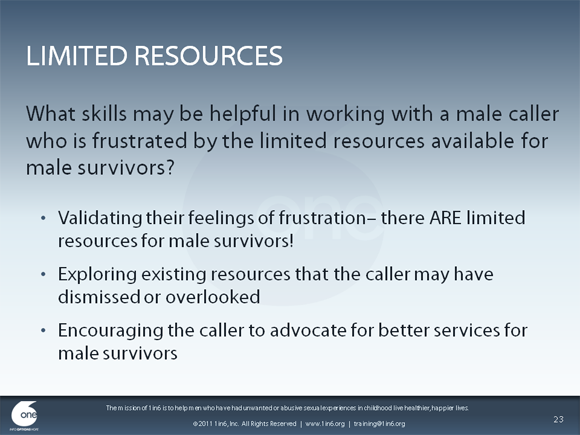
Limited resources
Slide #23
Introduction: Many male survivors may be frustrated by a lack of resources. In many areas of the country, there are limited resources for all survivors, but particularly for male survivors. Services that reflect the values and norms of communities of color and of non-English-speaking survivors are even more difficult to find
Question: What skills may be helpful in working with a 1in6 caller who is frustrated by the limited resources available for male survivors?
Validating their feelings of frustration– there ARE limited resources for male survivors!
Active listening. Allow the caller to express their feelings rather than dismissing their frustration.
Exploring existing resources that the caller may have dismissed or overlooked
All RAINN affiliates provide hotline services for male survivors as well as female survivors. However, a male survivor confronted with a crisis center with a name like “Women’s Crisis Center” may be reluctant to reach out to that center for help unless they know that the center has services available for men. HOTLINE volunteers/staff can encourage male survivors to reach out to these organizations.
Encouraging the caller to advocate for better hotlines for male survivors

Struggling with reactive thoughts or behaviors
Slide #24
Introduction: As we’ve discussed, there’s a wide-spread perception in the public that all men who were abused as children will go on to become abusers themselves, although statistically, only a very small percentage of men who were abused go on to be abusers. Some male callers may be concerned that they are going to become abusers themselves, and for some it may be a genuine struggle. Some may have actually engaged in an abusive sexual interaction with a younger child while they were still a child, in reaction to their own abuse, or they may have been coerced to participate in the abuse of another child as part of their own abusive experience.
Question: What might be some important things to discuss with a caller who is concerned about becoming an abuser?
Safety first: If the caller has actually abused, follow the same protocol that you would with any other abuser on the hotline. The resources at Stop It Now and Darkness2Light may be exceptionally helpful.
If they already have acted abusively, it may be possible to use the visitor’s concern for themselves to get them to reach out for help. By discussing with them the advantages for them (such as avoiding possible moral or legal problems, creating a positive life without secrets, not doing something that they will regret, etc.) of reaching out for help, it may be possible to motivate them to take action.
Reality check. Even though the public perception may be that men who were abused inevitably go on to abuse, the reality is that most men who have been abused do NOT become abusers.
Encouragement. They did a very strong thing by reaching out for help. Emphasize self care, that it is possible to lead a fulfilling life free of these thoughts and feelings.
Empowerment. Since they’re conscious of this, they can choose not to engage in abusive behaviors. They have the power to do this. With help, their life can be better.

Gender identity
Slide #25
Introduction: Male survivors who are using the hotline may be questioning their gender identity on several levels. They may be asking what it means for them as a man to have been sexually abused. (Keep in mind the complicated reactions influenced by their sexual orientation and the gender of the person who abused them.) They may also be asking what it means for them as a man to be reaching out for help. Again, consider cultural influences – race, nationality, class, immigration status, sexual orientation, ability or religious values and norms.
Question: What skills may be helpful in working with a male survivor who is questioning their gender identity because of their sexual abuse history?
Universalizing– they are not the only man who is dealing with these questions.
Leverage masculine values– emphasizing that it takes strength and courage to confront these issues and reach out for help.
Have them return to their seats.
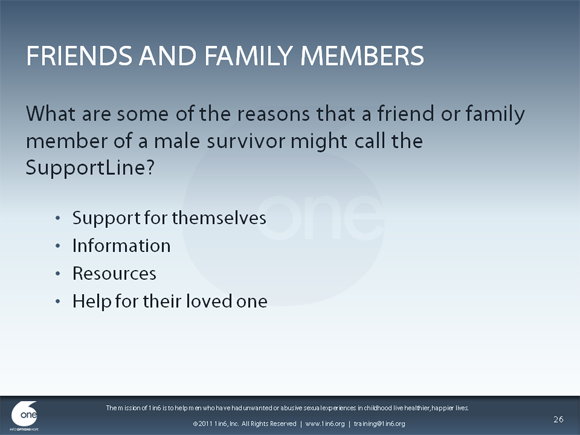
Working with friends and family members
Slide #26
Introduction: Friends and family members of male survivors are also encouraged to use the hotline. Their reasons for calling and expectation of what they need will be influenced by cultural norms and values as well.
Activity: What are some of the reasons that a friend or family member of a male survivor might contact the hotline?
Support for themselves.
If the survivor is going through a difficult time, the friend or family member may need help and support for themselves.
Information
They might be trying to understand what their loved one has experienced, want to be reassured that they are not the only one going through this or want more information about effects of sexual abuse on men
Resources
They may be looking for resources, ranging from information to counseling hotlines to help for their loved one
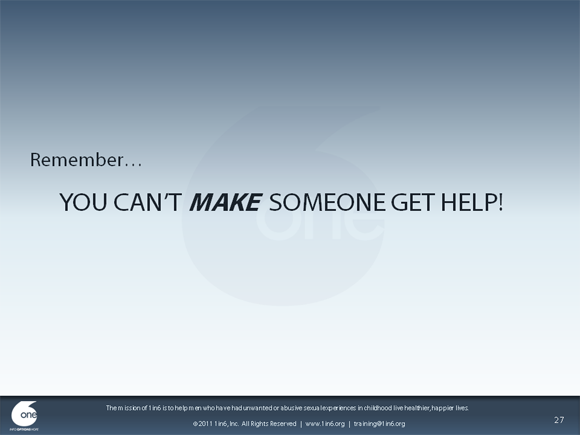
It’s wonderful that they want to help. It’s important for them to understand that they can’t make their loved one get help.
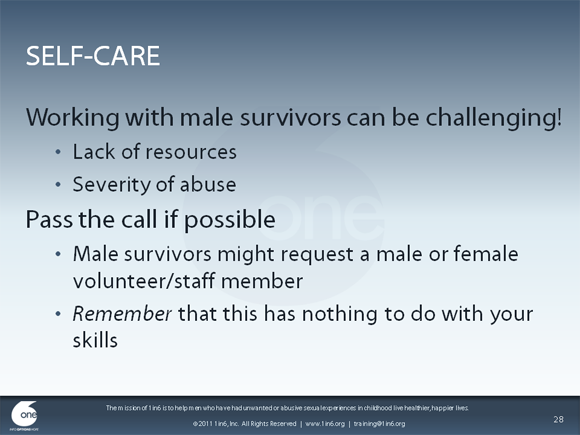
Self-care
Slide #28
Working with male survivors can be challenging!
Lack of resources can be frustrating for you and the caller
Indentifying resources for non-English speakers and men or families of color can feel even more challenging.
Hearing about the abuse can be stressful
Male survivors might request a male or female volunteer/staff because they feel more comfortable
Remember that this doesn’t reflect on your skills
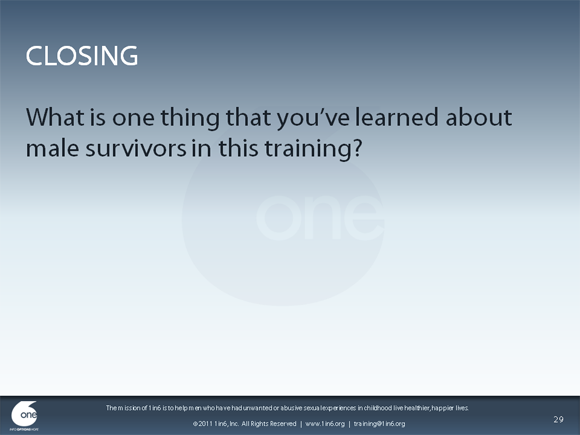
Slide #29
Activity: Closing exercise
One of the facilitators should take one end of the ball of yarn.
Explain that you hope that everyone, including the facilitators, takes something away from this training. Say that you would like each participant to name something they have learned or something that they will take away from the training when they get the ball of yarn. The facilitator should name something, and then toss the ball of yarn to another participant. That participant should name something and then, holding onto their piece of the yarn, toss the ball of yarn to another participant. This should continue until everyone has said something and then the ball should return to the facilitator.
The facilitator should thank the participants for their contributions and encourage them to think of their experience like the web of yarn that they have created—they are all connected and can depend on each other.
[PDF_form creator=ACT_Training marginleft=1 marginright=1 margintop=1 marginbottom=1 unit=in pagebreak=TRUE button_text=”Get Certificate”]







